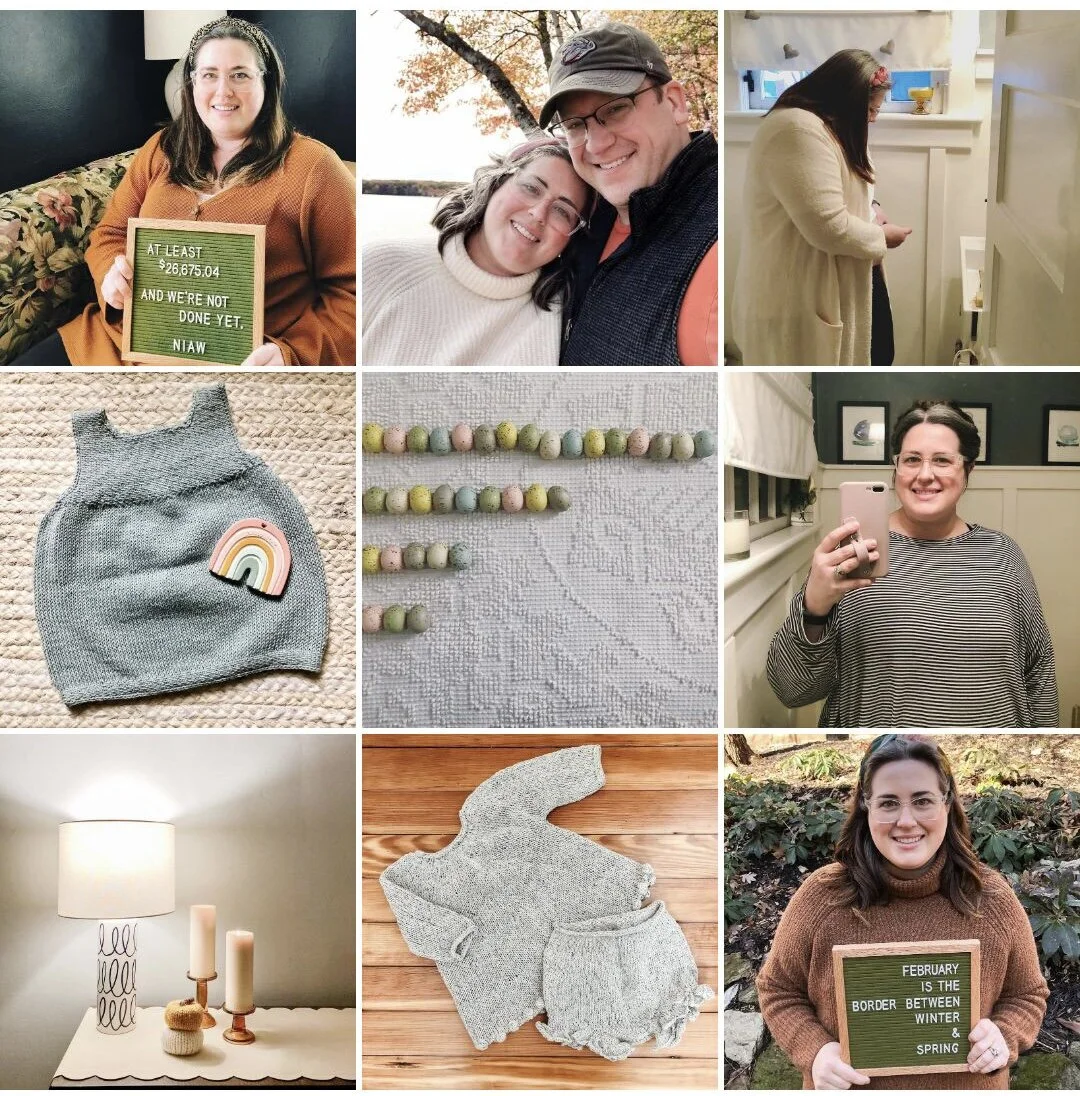Our Infertility Journey: Part One
/National Infertility Awareness Week is April 23-29. Infertility impacts approximately 15% of couples in America and is a result of abnormal functioning of the male or female reproductive systems. Because I have Polycystic Ovarian Syndrome (PCOS), I live with one of the most common causes of infertility in women.
If you've been following along with my goals posts so far this year, you'll remember that one of my goals is to worry less as we prepare for starting a family. Today, I'm kicking off a new series in which I'll be chronicling this journey. You can read all of the posts in this series by clicking here!
To be clear, my goal with these posts is to be open. Over the past year I've done a lot of searching to find experiences and stories from women living with PCOS and/or going through fertility treatments, and so far I haven't come up with much. Because I want to hear about what other women are experiencing, I am sure that others out there feel the same. While I know this is my story, I hope that by sharing it openly I will help someone else through whatever they are experiencing.
One of my dearest friends sent me this framed hand-lettered verse after Kurt and I experienced loss at the end of March.
The beginning of our story
As a child, I didn't often think about becoming a mom. I wanted to be a professional pianist, performing and teaching piano at the collegiate level. It was my dream and goal for so long, and as I grew up thinking about that future, a husband wasn't always a part of it and children were almost never a part of it. So when I was diagnosed with PCOS at about 20 years old, it didn't phase me. Children hadn't been important to me leading up to that time, so, learning that PCOS is one of the leading causes of infertility in women, I didn't worry.
Fast forward to the end of 2012 when I met Kurt. About two months after Kurt and I started dating, he told me he had a secret. A little nervous to learn what it was, I was relieved when he told me that he was (in his words) "baby crazy." In the almost five years we've been together, those feelings haven't diminished for him. And I just love listening to him talk about becoming a dad someday; his excitement is truly contagious.
While I didn't share his feelings at first, something shifted in me when I was 29. I didn't get nervous when he talked about becoming a parent, but began to feel excited with him! What was always in the back of my head, though, was my PCOS diagnosis. This condition doesn't make it impossible to become pregnant, but it is one of the leading causes of infertility in women. So I knew that becoming pregnant was not going to be easy.
Starting to try
In February of last year, Kurt and I became more serious in our conversations about starting a family. Because of our age and my PCOS diagnosis, we wanted to start conversations and appointments with doctors early in order to make sure my body was as prepared as it could be. I found an OB/GYN in Tallahassee that I really liked; in each appointment we had she gave me hope that becoming pregnant was something that was within our reach. We made changes to our diet, adjusted some of my medications and I started taking a prenatal vitamin everyday so that when we wanted to stop preventing, I would be ready to do so.
About six months later in August, we decided it was time to start trying. We had a list of recommendations and things to keep track of from my OB/GYN, and were hopeful that things might work naturally for us. Unfortunately, they didn't.
Because I have PCOS, my OB/GYN recommended that we only try without extra assistance for six months. In February of this year, that six month window closed, and Kurt and I took the important step of scheduling an appointment with a fertility specialist here in Tallahassee.
Seeking help
Our first appointment with the fertility specialist was in mid-February, and both Kurt and I walked away from that appointment immensely hopeful. Our doctor is direct and clear when he talks to us, something we both really appreciate. During that first appointment, after reviewing both our medical history's and having an ultrasound to see what the cysts in my ovaries looked like, I was given a prescription for Letrozole, which is a medication that helps a woman's ovaries to develop viable eggs.
What I didn't anticipate in working with a fertility specialist is how often I would need to be seen. After that first appointment, I was back nine days later for another ultrasound to see if the medication worked. During that appointment we learned that the Letrozole didn't work how it was supposed to, which meant I needed to try a different medication called Clomid. This medication does the same thing - helps a woman's ovaries to develop viable eggs.
Five days later I was back for another ultrasound which showed that Clomid had worked! With two viable eggs (one in each ovary), I left with instructions for what to do next. The next few days involved ovulation kits, timed intercourse, and a lot of waiting. We had to wait 15 days and at the end of that time period were expecting either a positive pregnancy test or my menstrual cycle to begin. On day 15, I had a negative pregnancy test, but still hadn't begun my menstrual cycle. Because I had started experiencing some pregnancy symptoms during that waiting time, we were still hopeful.
Hope and loss
Four days later I took another pregnancy test. This time, it was positive. Another ultrasound appointment a day later showed where an egg had been released, and first round blood work confirmed the home test. I was pregnant. I made an appointment for three days later for second round blood work, which would hopefully show the pregnancy hormone levels doubling as they were supposed to.
During those three days I was nervous. We had been so hopeful that this process would work, and had started thinking and planning about what the next few months could look like. I remember waking up on the second day and feeling like something was off. I must have asked Kurt fifty times that day if he thought everything was OK and I was pregnant. And on the third day, the day of second round blood work, I was even more nervous, feeling more and more like something was off inside my body. Those hours of waiting after that appointment until the phone call we'd receive the following day with the results were terrible.
The following morning, I started experiencing some bleeding. The phone call I received from my doctor that afternoon confirmed that the blood work showed what we didn't want. Instead of doubling, my pregnancy hormone levels dropped to the negative. I was having a miscarriage.
Something else that I didn't anticipate was how many days a miscarriage can last. In total, it took four days for everything to happen. Four days of feeling like I failed. Four days of lots of tears and comfort foods. But four days also of growing closer to Kurt as we navigated this together. And four days of some of the strongest support I've ever received from a group of friends.
They gave me grace and encouragement and understanding. In the few moments of calm that I felt during those days of the miscarriage, it felt like their prayers were washing over me in a way I had never experienced before. And it felt like this was exactly what was supposed to be happening to me, as heartbreaking as that is. It felt like I was living Galatians 6:2.
Bear ye one another's burdens, and so fulfill the law of Christ.
Galatians 6:2 (KJV)
Moving forward and what happens next
Since that last week in March, we've been living in another waiting period. My doctor recommended I go through an entire menstrual cycle in order for my body to heal, rest, and reset. This week is the fourth week of waiting, and we are looking forward to being able to begin the process again next month.
We've continued talking about our wishes and hopes for having a child. We've started a baby registry and continued researching all of the things that a baby needs (and also those things they probably don't need). We've shared our experience and plans with family and friends and co-workers, and found hope and support in each conversation we've had. We've continued to dote on our dog Sydney, and even had an Easter egg hunt with eggs filled with dog treats just for her.
As Easter weekend came and went, I found myself struggling a little bit with finding the joy in Easter Sunday, because I feel like I'm stuck on Saturday. I'm stuck in the waiting to see what happens after the death and loss, and I don't know if or when the resurrection and life will come for us. So I'm trying to trust the process and the timing as we prepare for the next month and trying again.
For those of you who might be experiencing something similar, or know someone who is, here are a few blog articles, podcasts, and scripture verses that have helped me these last few weeks:
Coffee and Crumbs: Grief's Turn to Talk
Coffee and Crumbs: Six Days Late
Big Sky to Big Apple: Anticipating a Son
Emily Ley: Infertility. It is well with my soul.
Mattye Woodcock: Good God. Good Friday.
Mattye Woodcock: We don't have to be afraid
Monocycle Podcast: Be Delicate with Yourself
God Centered Mom Podcast: Grounded Joy with Ellie Holcomb














